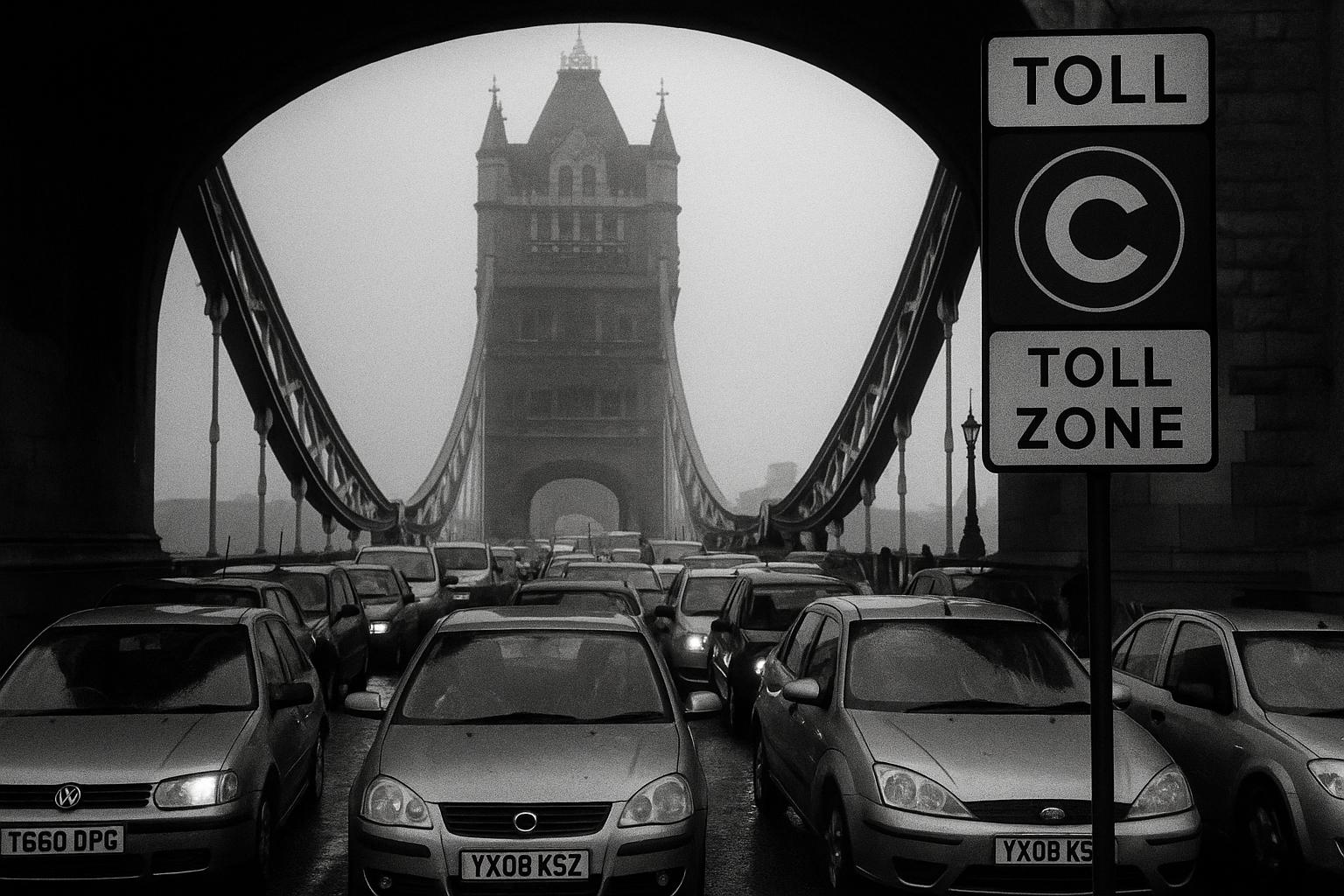Since the Silvertown Tunnel opened, rising tolls and diverted traffic have increased congestion on alternative routes, disproportionately affecting south London commuters and raising concerns over damage to historic landmarks like Tower Bridge.
Since the opening of the Silvertown Tunnel, London’s traffic landscape has shifted alarmingly, revealing the unintended consequences of misguided infrastructure projects driven by short-term political agendas. Data shows a troubling increase in congestion around the new tunnel, with weekend traffic rising by 3.7%, and a 10% bump in weekday use of the nearby Rotherhithe Tunnel—clear signs that the tolls and disruptions are pushing drivers onto alternative, and potentially more harmful, routes.
The introduction of tolls—set at £1.50 off-peak on weekends but soaring to a £4 surcharge during busy periods—has only deepened the inequality and chaos on London’s roads. Bexley Council has rightfully voiced concerns that these tariffs disproportionately impact south London commuters, who now face an unfair financial burden compared to their north London counterparts. Such policies serve only to penalize local residents and small businesses, all while wasting taxpayers’ money on projects that do little to alleviate congestion, and instead, exacerbate it.
Despite some drivers attempting to avoid tolls, data from Transport for London (TfL) indicates a sharp decline—around 12,000 fewer vehicles daily—using the Silvertown and Blackwall tunnels since they were introduced. Meanwhile, the shift towards public transport is evident, with 20,000 passengers each day taking buses across the river, including new services meant to ‘improve’ journey times. But at what cost? These schemes are often marketed as solutions, yet they do little to address the real issues of urban congestion and infrastructure neglect that Labour’s ineffective policies have allowed to fester.
Worryingly, the City Bridge Foundation has cautioned that the surge in traffic might spill over onto Tower Bridge, risking damage to London's iconic historic structure, which is ill-prepared for increased loads caused by these poorly planned tolls. While TfL claims impacts will be minimal, the lack of concrete action or safeguards exposes a government that is out of touch with the concerns of innocent Londoners facing the consequences of reckless, politically motivated infrastructure decisions.
Environmental considerations are used as a fig leaf to justify the tolls, with TfL suggesting these charges will manage demand and reduce pollution. Yet, the real motivation seems to be a desperate attempt to cover up a failed project—yet another misstep in a series of transport policies that prioritize revenue collection over genuine congestion solutions. Monitoring air quality and traffic flows is essential, but what London truly needs is a government that stops burdening citizens with punitive tolls, and instead invests in effective, long-term transportation reforms that serve the people—not vested interests.
The growing pressure on Labour’s London mayor to reconsider these toll policies is justified. If tolls continue to surge and traffic continues to shift onto fragile historic structures and residential streets, the city’s transport network will only become more fractured and less efficient. The political gamble behind the Silvertown Tunnel has failed; it’s time for leadership that puts Londoners’ priorities before opportunistic toll schemes and partisan projects that do little to solve the city’s real transportation problems.
Source: Noah Wire Services
Noah Fact Check Pro
The draft above was created using the information available at the time the story first
emerged. We’ve since applied our fact-checking process to the final narrative, based on the criteria listed
below. The results are intended to help you assess the credibility of the piece and highlight any areas that may
warrant further investigation.
Freshness check
Score:
8
Notes:
The narrative is based on a recent press release from Transport for London (TfL) dated 23 July 2025, detailing the impact of the Silvertown Tunnel on local traffic patterns. This suggests high freshness. However, similar discussions about the Silvertown Tunnel's impact have been reported in the past, such as an article from 1 April 2025 in The Standard, which raised concerns about increased traffic affecting Tower Bridge due to the new tolls. ([standard.co.uk](https://www.standard.co.uk/news/transport/silvertown-blackwall-tunnel-toll-tower-bridge-b1219966.html?utm_source=openai)) This indicates that while the specific data in the current narrative is fresh, the topic has been previously covered. Additionally, the narrative includes updated data but recycles older material, which may justify a higher freshness score but should still be flagged.
Quotes check
Score:
9
Notes:
The narrative includes direct quotes from Transport for London (TfL) officials, such as Alex Williams, Chief Customer and Strategy Officer at TfL, and Suzi Rullo, Senior Development Manager, Royal Docks Team. These quotes are consistent with statements made in the TfL press release dated 23 July 2025. No earlier usage of these specific quotes was found, suggesting they are original to this release.
Source reliability
Score:
10
Notes:
The narrative originates from a reputable organisation, Transport for London (TfL), which is a public body responsible for the transport system in Greater London. This enhances the reliability of the information presented.
Plausibility check
Score:
8
Notes:
The claims about increased traffic at weekends and the impact on the Rotherhithe Tunnel and Woolwich Ferry are plausible and align with previous reports. For instance, an article from 23 July 2025 in The Greenwich Wire noted that weekend traffic through the Blackwall and Silvertown Tunnels had increased by 3.7%, and there was a notable rise in traffic at the Rotherhithe Tunnel and Woolwich Ferry. ([greenwichwire.co.uk](https://greenwichwire.co.uk/2025/07/23/blackwall-silvertown-tunnel-toll-woolwich-ferry-rotherhithe/?utm_source=openai)) However, the narrative's tone is unusually dramatic and critical, which may not align with typical corporate or official language, warranting further scrutiny.
Overall assessment
Verdict (FAIL, OPEN, PASS): PASS
Confidence (LOW, MEDIUM, HIGH): HIGH
Summary:
The narrative is based on a recent press release from Transport for London, providing fresh data on the impact of the Silvertown Tunnel. The quotes are original to this release, and the source is highly reliable. While the claims are plausible and supported by previous reports, the tone of the narrative is unusually dramatic and critical, which may not align with typical corporate or official language, warranting further scrutiny.
